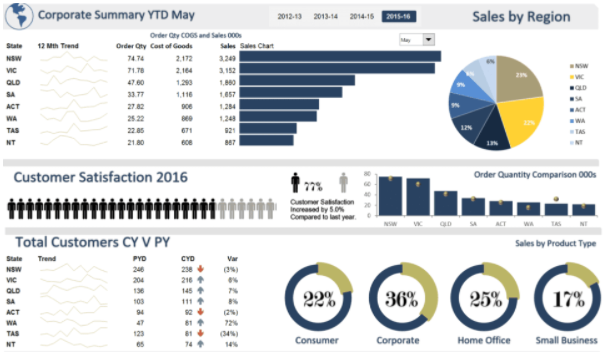To build the best practices in tableau dashboard to get the maximum number of insights, there are some strategies that one needs to follow. Before you look for Microsoft Power BI consulting services, it would be better to gather some basic knowledge about the Tableau dashboard design.

If you have to meet your customers’ requirements, we, the developers of Tableau development USA, at Techcronus are here to help you with some dashboard designing tips and tricks. Without further delay, let’s get started.
Table Of Contents
-
- Keep the business goal in mind
- Effective dashboard layout
- Aim for better performance
- Use suitable charts that match your goals
- Have an idea of colour types and the purposes they serve
- Reduce dashboard objects to maximize actionable insights
- Types of navigation in Tableau
- Proper perceptions for designing
- Conclusion
Keep the business goal in mind
Instead of throwing away all your new worksheet into the bin, keep them as they may be used later. Also, when planning to prepare any Tableau dashboard design, think of the goals first. Consider what you want or expect from the design and then start working on it. This will allow you to understand what your customers want. Also, you can use the five-second rule where you should display the dashboard in front of your customers and see if they can make anything fruitful out of it.
Effective dashboard layout
According to visual science, the top of the screen is the place where our eyes go first. So, if you want to put any critical notice or information, the top of the screen can be utilized. The layout of all the pages should be done correctly so that users do not find any difficult to find information. If needed, the options’ use as filter’ can filter the information required to the other page.
Aim for better performance
Divide the dashboard design into several categories to reach the desired level of precision. To do this, begin with the summary and then gradually move ahead to the details. Give users the choice to narrow down to the respective detail that they want. Further, the data source should be flexible enough to be developed for enhancing performance.
Use suitable charts that match your goals
Instead of putting numbers randomly on the screen, arrange the numbers visually appealingly using relevant charts and graphs. Given below is a table that will show which charts are suitable for which purposes:
| Charts | Purposes served |
|---|---|
| Bar charts | Compares numbers |
| Stacked bars | Presents categorical comparisons |
| Line charts | Shows the trends that have changed with time |
| Scatter plots | To depict outliners |
Have an idea of colour types and the purposes they serve
When you work with data, primarily while representing it, tableau best practices look at the values of the data and likewise apply color to it. In Tableau, these are the colors used:
- Gradient colors – to depict scale.
- Divergent colors – to show a profit.
- Categorical colours – to categorize items (different colours are used for another category).
When choosing the colour, consistency is one thing that should be rightly maintained. The colour that you choose as a default one should be kept the same for all pages. For changing colours, click on the ‘colour’ option followed by ‘edit.’
Reduce dashboard objects to maximize actionable insights
When the information can be conveyed, put everything in one worksheet. Let us take an example here. If you have more than one category page, avoid displaying it separately on separate bar charts. Instead, use different colours, shapes and sizes in the worksheet to show them from other dimensions. Your goal should be to minimize the confusion of the users and make the presentation as clear to them as possible.
Types of navigation in Tableau
Three types of navigation can be used in Tableau – select, hover and menu. In select, the bar chart can be clicked. On the other hand, in hover, the data bounces back when overused. Again, the case of menu navigation takes the user to a completely separate worksheet.
Proper perceptions for designing
When using charts and graphs, make sure that you do not distort reality. After all, these representations are nothing by the graphical presentation of the truth. Tampering the data will never make both ends meet.
Conclusion
Therefore, designing a tableau dashboard ideas can be made easy by using the tips mentioned above and tricks. Still in a dilemma? Take the help of Techcronus’s experienced tableau developers today.
















 Get Started
Get Started
